
Bandit Lites, Inc. is celebrating 55 years in business this year, having come a long way from their days of “borrowed lights” from the local school to light bands on the weekend in the late 60s. [These resourceful beginnings would be evoked in the company’s name, Bandit Lites. And yes, they always returned the lights.] Today, from those humble beginnings in Kingsport, TN, Bandit has grown to an industry leader that was among the first of the U.S. lighting production houses for concert touring. They continue to blaze new trails in best practices for the industry and the ‘Bandit Standard’ is second to none. With more than 300 employees, Bandit has offices in Knoxville, Nashville, Charlotte, San Francisco, London, Hong Kong and Taiwan.
An entrepreneurial spirit has always been in the DNA of Bandit Lites’ Chair and Founder, Michael T. Strickland, who as a 6’-2” kid that looked older than his age, bluffed his way into lighting bands when they came to his hometown of Kingsport, TN. He would sneak into school and borrow gear to light acts that came through the local southeastern gyms and National Guard Armories. The Beach Boys, The Monkees, The Grass Roots, and Frankie Valli & The Four Seasons were a few of those early Bandit clients.
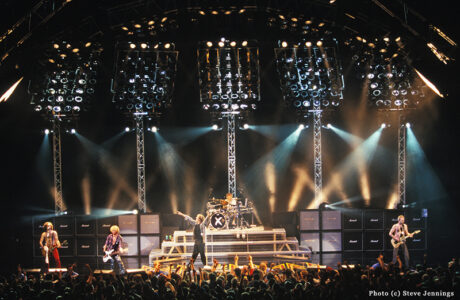
Bandit Lights would grow up alongside bigger and bigger acts. In the early 1970’s, Strickland was able to persuade the management for the Conway Twitty and Loretta Lynn tour to use Bandit Lites. They were the A-list act that gave Bandit real legitimacy and led to working with Kenny Rogers, which took Bandit to the next level with Rogers’ 1977-78 The Gambler tour. Getting in with bands at their earliest stages has been essential to Bandit’s growth. Garth Brooks, whose relationship with Bandit began in 1989, (when Brooks came to Bandit and asked for a rig the size of the one K.I.S.S. had out), continues to this day. After being approached by Michael Stipe of R.E.M., Bandit would go on to support the act until they disbanded over two decades later. Bandit also worked with a number of the ‘80s heavy metal powerhouse acts including Quiet Riot, Twisted Sister, Krokus, and Ratt. In the late ‘80s, Bandit started working with a small act of the time, Jimmy Buffett; that relationship still continues today. Acts like Alabama and Garth Brooks—both who came on early in their careers—would have larger rigs than most rock acts of the time. Both would also become key to Bandit’s establishing itself in a leadership position in the market to this day.
Never a company to be pigeonholed, Bandit Lites works for far more market segments than just concert touring, including television, film, events, and festivals. Bandit also has a systems integration division for permanent lighting installations. During their five-plus decades they have innovated and promoted game-changing products for the touring industry, set new standards of crew training and compensation, and led on many of the most pressing issues of the industry.

The awards and honors bestowed on Bandit Lites through the years are too numerous to list, but a few include CMA’s Production Company of the Year, Pollstar Lighting Company of the Year and, of course, the Parnelli Award for Lighting Company of the Year. With a roster of A-list acts—Brooks, Buffett, Carrie Underwood, Alice Cooper, Jason Aldean, among many, many others—and a list of global events as well as historic milestones, Bandit Lites may be celebrating its 55th anniversary but it is certainly not slowing down. To learn more about what makes Bandit the well-regarded and visionary company it is, PLSN spoke with Strickland, as well as his Bandit colleagues, VP of Business Development Brent Barrett, VP of Business and Innovation, Jake Tickle, and Dizzy Gosnell, Vice President of Production.
As to how a pioneering lighting company finds its way in an essentially non-existent industry, Strickland recalls, “When we started out, in those early days of ‘68 to ‘74. I mean, that’s when there was no such thing as concert lighting. You had people in New York and in L.A. doing all the psychedelic stuff, but not really concert lighting. Back then, the touring model was that the bands came to a town, played usually at either a high school gym or a National Guard armory. Big acts would play there, because you have to remember the big basketball arenas didn’t exist yet. So, when the Beach Boys would come in, or The Grass Roots, or Frankie Valli and the Four Seasons, we would come and do the lights. They all would say, ‘Wow, this is cool stage lighting, we don’t normally have this,’ which would lead to them asking, ‘Can you come tomorrow to Asheville or Charlotte, or wherever they were headed next.’ And that’s how Bandit really began. The people I met back then were so important, not just as jobs at the time, but because those relationships grew into other work. For example, in ‘69 I met Warren Entner, who was the lead singer of The Grass Roots, one of the biggest bands in the world at the time, and we worked with them until they ended. Now fast forward to the early 80’s, and Warren is managing Quiet Riot, Faith No More, Rage Against the Machine, and Suicidal Tendencies. Here’s this 1969 relationship that in the 1980’s now put us in touch with some of the biggest bands of that era.”

“This whole industry is relationship based,” Strickland continues, “that is how it started and still is today. You start with getting The Grass Roots and from that we got Quiet Riot, and from them we got Twisted Sister. The whole hair band era for us was huge. We ended up doing Ratt, Twisted Sister, Quiet Riot, Van Halen, and all these other bands. One thing leads to another, that is how it has always worked. That is what happened when we hooked up in the early days with Conway Twitty and Loretta Lynn. That was when nobody wanted to do country music, but we did it and they went all over the country for 15 years taking us with them. Working with them led to meeting Kenny Rogers; I became his production manager and ran the show and Bandit did the lighting. That journey was an incredible path for us in country music. So, it has been all of those different client relationships that over the years have led to other work. That is how Bandit grew over the years in all the different genres of music.”
Being there in the early years of Bandit gives Barrett a good perspective on how Bandit grew into the company it is today. He, in fact, goes all the way back to elementary school in his friendship with Strickland. Barrett agrees that the Lynn and Twitty tour was pivotal to Bandit, noting, “I think that was a real biggie when Conway Twitty and Loretta Lynn came along. They were a real A-level touring act in the early ‘70s and Strickland was able to pull off getting the agreement for Bandit to do the lighting for the tour. That really helped take the whole company to a different level. It was a whole different level of exposure. After Conway and Loretta, we were fortunate enough to get Kenny Rogers, and then the rock act, Blackfoot. We expanded with acts including Alabama, Jimmy Buffett, and of course, Garth Brooks. Each of those acts put us in a situation where we had to rise to a different level, and we did. It was that succession of acts in the early days that was really an integral part of why the company is where we are now.”
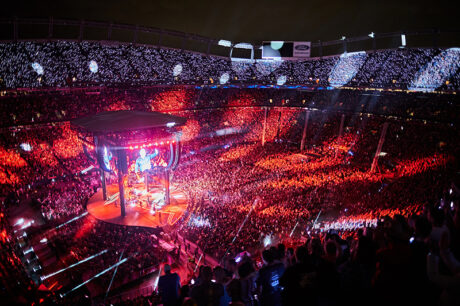
The Bandit Standard
Every one of the milestone acts booked also brought opportunity to Bandit in other ways, as Gosnell points out. “Garth Brooks was certainly one that we were able to build off of at just the right time, because he was doing lots of dates. His were long duration tours out with big rigs that meant those Garth tours gave us the ability to fund R&D, and purchase inventory. Garth was very important to the expansion and growth of Bandit in the ‘90’s.” When it comes to a show that helped define or change Bandit, Tickle also noted another longtime Bandit client. “The WWE, in my experience, was pretty groundbreaking because we had to adapt to things that were constantly changing,” he explains. “It was constant one-offs. The crew in the shop really had to figure out how to think on their feet quickly and turn the gear around very fast. I think that helped us really define our process on how to make things happen, and in a really tight fashion. It certainly refined what is the Bandit Standard. That’s how we prep; every tour gets prepped identically. Before the WWE that system was there, but the WWE days made that process solidify and really made it into a well-defined system of how we do things.”
Tickle, having been the Director of the Technical Service Division for a good 10+ years out of his 17 years at the company, has helped to ensure the Bandit Standard is understood and embraced by new hires. “All of our upcoming crew go directly into tech services typically,” Tickle states. “They get a full understanding of how to break down all the way to the glass and repair fixtures. A lot of the younger crews have no experience with doing that. We can’t do much to train them for actually being on the road and being on the bus, but what we can do is put a feather in their cap and give them a skill set that is greatly needed on tours, and that’s in the repair world. Especially because a lot of the crew chiefs these days don’t have the time to do the repairs. So, we build up our younger crew to do that. After time in tech services, then people will spend time with inventory control, understanding all of the gear that we have, and then we put them out onto the prep floor. They’ll spend time on the prep floor until we feel they’re confident. That is when we marry them up with the right crew; the right opportunity for them to be successful on the road. We also continue to develop people’s skills throughout their tenure at Bandit. I have individual conversations with every single one of my touring employees. I want to make sure that they’re on the right track, making sure they’re consistently learning, making sure they keep that intellectual curiosity to continue to develop their skills. We want them to succeed.”
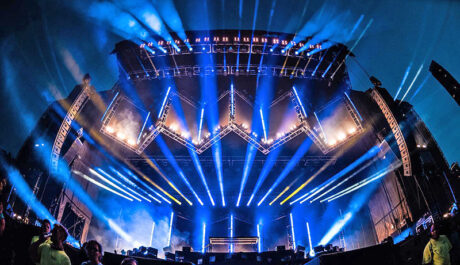
Gosnell, who has been at Bandit 30 years, concurs that Bandit creating a prep standard and documenting everything has been invaluable, commenting, “It was a big thing at Bandit turning preps from, ‘oh crap, we’ve got a rig to prep and get it on a truck’ to maybe not a religion, but very close. Bandit developed a very clear way we do things and the reasoning why we do things that way. We came up with touring prep books. We log everything down; label everything; and we put it in prep books. So even if the crew change is only partially—or in some cases completely—from one leg of a tour to another leg, there is consistency. You can only do that if it is documented properly at the beginning.” For Barrett, that attention to detail engenders client loyalty. A trust that all starts with the equipment prep at the shop. “We prep systems in their entirety before they leave the shop,” he says. “When our gear goes out, it’s ready to plug-and-play. Paperwork-wise, we provide the client with detailed truck packs, lighting and rigging plots. All these are things that have no charge; they’re just value added items. The Bandit Book has everything pertinent in it for the production manager and all the crew.”
“We do the same for every client,” says Gosnell, “we treat a one-off the way we treat a tour; the level of prep is the same. The level of detail is the same, everything is pre-thought out as much as possible. We’ll have had a lot of discussion about things and try things out in the shop, all the details considered. So, once we get to rehearsals, we’re in much better shape. We’ve already mentally built the rig four times and we may have physically built it once or twice. Also, we have a project manager who is assigned to a particular show who oversees it from the build and prep of the rig in the shop, through the duration of the tour. The crew chief might change, especially in this current crew climate right now, but the project manager is the constant source of knowledge and information about that particular show.” Tickle agrees on the value of taking client support seriously, adding, “We strive to give personal attention to every single project. It doesn’t matter how small your project is, or how big your project is, it’s going to get the same amount of attention. It’s going to be prepped the same, it’s going to be ready to roll right out of our shop. We don’t just put cable in a case. Our attention to detail and our process is second to none; it is always up to the Bandit Standard.”

Valuing People and Clients
Not ones to rest on their laurels, the Bandit team is always looking for ways to improve as described by Barrett, “We’re always—on all levels, from in the shop to our road techs—trying to improve. We don’t just say, ‘we’ve mastered this,’ we try to look for those things that we can improve. We talk about everything at the end of the tour. We will have a debrief with each of the people on the tour to get their perspective of what we could have done better or can do better in the future. I think all of that is important and reveals care at the end of the day to the client.”
For Strickland, it is no mystery what clients value at Bandit Lites. “Our people,” he immediately replies. “Right from the early days, I realized that people make any company. Surround yourself with people of passion and treat them well. That is what I learned and what I believe. At Bandit we really value our people, and they know that, and they stay at Bandit. We’ve got more than 50 people that have been at Bandit for over 20 years. We’ve got 10 people that have been here 40 years. And we don’t play mix and match with our clients’ crews. Jimmy Buffett’s had the same crew for 35 years; Brooks & Dunn had the same crew all 20 years that they first were out. Alice Cooper had the same crew for the last 22 years, and so on and so forth. Garth Brooks has the same crew from 1989 forward. Our crews become part of the fabric and the family of the artists that we work with. And yes, we do use freelancers, when we run out of people, but 25 years ago we set up our own external labor company called Best Techs. We bring you in through Best Techs and we pay all of your payroll taxes, and you’re covered by workers’ compensation. But back to our clients, that is one of the things they value about us, we keep their crews, they don’t have to worry about losing their people. That and our prep—the Bandit Standard. The amount of work that we get because of the way that we prep is stunning. So, between the quality of our people, the level of training of those people, the consistency of our crews, and the quality of our preps, all of that is what gives us the longevity with, and the loyalty of, our clients.”
Showing Strickland truly has built a company that puts its people first, when asked what’s something some in the industry might not know about Bandit, Tickle, Barrett, and Gosnell all mention how Bandit takes care of its people. Tickle states, “Over half of our touring employees are full-time, fully benefited employees. We have some of the best benefits in the industry, by far, with a phenomenal matching 401k, paid time off, and a great health insurance plan. This company is built around the fact that you can have a career at Bandit. Bandit doesn’t have to be just a stop in your life; it can be an entire career if you want that.” Gosnell, too notes, “Everyone says that ‘our people are the most important part of the company,’ but at Bandit, we mean it sincerely, and the benefits package, which we have had for a long time, shows how important our people really are to our company. Also, I want to say that Michael did a good job of keeping everyone on board during Covid. That was big and that is how Bandit treats people.”
When the industry shut down for Covid, Bandit didn’t furlough any of its full-time staff. Barrett explains, “Michael, at that time, decided to keep the full-time Bandits working. He paid all the full-time Bandits through the entire shutdown. I think that says a lot about an owner. In that very uncertain time, our people could count on money.”
Covid was not the first time that Strickland and Bandit chose to protect its employees during a financial crisis. During the U.S. economic crisis of 2008-2009, Bandit’s financial advisors made the usual recommendations to the company; cancel health insurance, cancel 401ks, and cut at least 10 percent of the staff. Strickland rejected all of those suggestions and instead recalls, “We burned through $30 million riding out the storm.” The full-time status and the benefits package, pioneering ideas in a freelance industry, especially in the mid-1970s, were Strickland’s answer to what he experienced firsthand. “I used to work calls from ‘72 up until about ‘82,” he comments. “I belong to the IATSE Union, I joined in 1973, I have a lifetime card now. But the reason I worked those calls was to see how other people did things, and the biggest takeaway I got from working calls was the fact that everybody was freelance. Everybody was underpaid and nobody had any benefits. I was determined by 1975 that I was going to give people health insurance, retirement, and paid vacation. All the sort of normal things that you’d get if you worked at a so-called ‘regular’ job. So, we did that way back in the late ‘70s, and we’ve done that to this day. I thought back then that I was going to change the industry. Well, I can tell you in 2023, outside of Bandit, the number of touring lighting technicians that actually have a full-time job are very few. The problems I saw coming with that model were certainly exposed to our industry during Covid.”
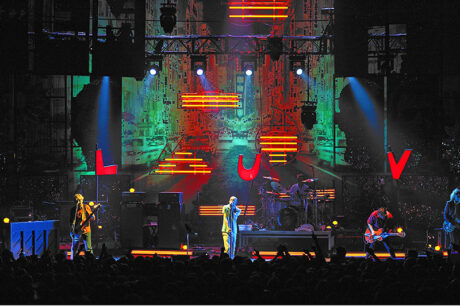
Changes and Watersheds
After the last few years, Gosnell feels that the industry has changed for everyone involved in it. It’s going to take some time to get used to the new paradigm. “We’re in a new era for pretty much everybody right now. Everybody in production is trying to look to see what direction the business is going, with costs and pricing, with the availability of gear, people, venues, all that sort of stuff. It’s a different ballgame now than it was three years ago. In many ways, I think, people are only just coming to terms with that. Whether it’s agents, promoters, band management, bands themselves, they’re all starting to realize that it’s not the same as it was in 2020. It is a different business and different priorities have taken place for a lot of companies now. You can’t just do every gig because you want to, you have to think about what you are taking and what you can do and then still keep your attention to all the details.”
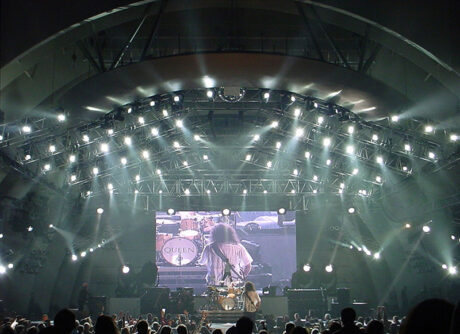
It isn’t the first time change has come to the industry and as ever Bandit Lites will be prepared—in fact, if history repeats, Bandit Lites will be among those who lead the changes. Strickland, who has both a business degree and a law degree, points out three watershed moments for Bandit from a business perspective, “First I think of in 1980, when I met Graham Thomas from Thomas Engineering. I ended up buying the American rights to Thomas Engineering’s Thomas Truss, which I owned for 15 years. And from that I ended up also purchasing the American company for Tomcat. During that same timeframe, Avolites was sold by the Carlton Group and I bought the U.S. Avo operation. So, for five years I had the U.S. Avo, Tomcat, and Thomas. I eventually exited out of all of those, but prior to my buying those, in America, it was the Wild West for truss. Everybody made their own truss. Before I bought Thomas, See Factor made their own, McManus made their own, Morpheus, Showlites, they all made their own truss. There was no standard to it. When I bought Thomas and set it up very slowly, we began to establish standards. We introduced the lamp bars and Socapex cable. Within about three years, if you didn’t have standardized Thomas truss, standardized lamp bars, and standardized cable, you went out of business. So that was actually a huge watershed moment. Not only for us, but for the whole industry. As a company of course, it was a huge watershed moment for the simple fact that we introduced it, we had it first, we had more of it and so we were the industry leaders in it, which carried us a long way.”
He continues, “Probably the next watershed was when Vari-Lite had a complete stranglehold on the moving light business. I flew to Denmark and met with Kristian Kolding, the CEO of Martin at the time, and convinced him that he needed to do a deal with me. Bandit ended up with 2,000 Martin lights and instantly overnight there were now two companies that could provide a quantity of moving lights, Vari-Lite and Bandit. That was another key moment in the history of the industry. And the third watershed moment is fast-forwarding from that to a guy named Garth Brooks, who changed everything for us. We were involved with Garth from the very beginning. Garth owned everything except lighting. Buses, trucks, sound, stage, he owned it all but his lighting. There were always rumors that Garth owned Bandit, because he was known to own everything of his, but he’ll tell you that Bandit was the one vendor he never owned. He didn’t need to, he trusted us. That relationship has been immensely important for our company.”
Doing the Garth Brooks’ tour also helped dispel a negative that Strickland said dogged Bandit Lites into the early ‘90s. “A thing that was used against us as a negative, but became a positive, was that when we got bigger and bigger, all of our major competitors were in New York and Los Angeles. They would say to the acts, ‘you can’t use Bandit. They’re a bunch of rednecks from Tennessee. They don’t know what they’re doing.’ But then in 1993, when Bandit was doing Garth Brooks, and Aerosmith, and R.E.M. as well as five or six of the other biggest bands of the day, people turned around and went, ‘Well, wait a minute. Those guys in Tennessee are doing all the big tours.’ Suddenly we didn’t seem so silly for staying in Tennessee. Fast forward to 2015, and virtually every major sound or light company, and most of the trucking companies were opening an office in Nashville, TN. Nashville is centrally located and an ideal place to have gear and people located to work out of, and around the country.”
Perhaps, among Bandit’s forward thinking should also be included the example of their constantly embracing new technology in true visionary fashion. The team worked to design, create, manufacture, and market a proprietary line of LED equipment, GRNLite. The creation of this range was inspired by longtime Bandit client, and staunch environmentalist, Jackson Browne. “Jackson came to Bandit and worked with Dizzy Gosnell and the team,” Strickland explains. “Crosby, Stills & Nash and Neil Young soon joined the movement, and GRNLite was born. By 2011, Bandit Lites owned more LED lighting fixtures than anyone else in the world.”
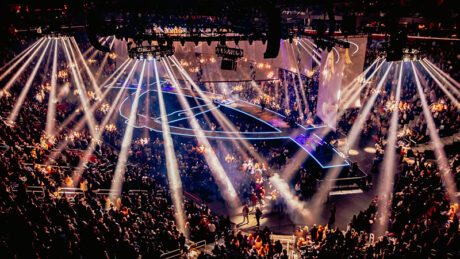
Proud to be a ‘Bandit’
Beyond the industry’s technology and Bandit’s people the company, under Strickland also looks outward. Farm Aid has been a Bandit project since 1991. Bandit also began a corporate giving campaign that includes over 60 charities today and involves hundreds of thousands of dollars each year, supporting The United Way, The American Heart Association, Boys & Girls Clubs of America, among many others. It is this view of caring and going that bit extra to do things right and thoughtfully that makes Tickle, Gosnell, and Barrett proud to be Bandit employees.
Gosnell states, “For all the time I have been here, it’s always been about consistency and reliability at Bandit. Consistency and reliability are also the way I feel about working with Bandit too. It is a company that can be relied on to take care of its people, and its clients, consistently. It is nice to be part of a company that can honestly say that, and Bandit can.” Tickle comments, “I have a massive sense of pride working here. I feel like I have input and that I can help younger people grow in this industry; be successful in the industry. That’s something that I feel Bandit has always done. Some of the best and brightest who are succeeding in the industry now got their starts at Bandit Lites. Bandit builds a firm foundation, and I’m proud to be part of giving that foundation to people.”
Barrett recalls, “I remember back in the 70’s, as we were trying to grow and get these opportunities, we finally reached the need for a semi-trailer. Somehow Michael was able to pull off renting one. The only problem was none of the six of us working at Bandit at the time were able to drive a semi. So, we got a college friend who had a brother who was a truck driver to drive the semi off the rental lot and bring it to our shop. Then the six of us practiced driving that semi the rest of the day, backing it up, all that. The next morning with that semi, now loaded up and a station wagon, we headed to San Diego. Essentially, the six of us learned to drive a tractor-trailer driving West across the country. Not something I’d recommend today. Actually, I wouldn’t have recommended it then, but we were all that young and foolish.” He continues, “It has been a lot of fun and very rewarding working at Bandit. I feel like it’s been a good life choice. Back doing the weekend things with Strickland in the early days, just to make a little extra money during college, I never thought about it as a career. It was just an opportunity to do some traveling and make a little money. You never know which direction your life’s going to end up in. Being part of Bandit is something I’m very proud of; it’s deeply a part of me.”
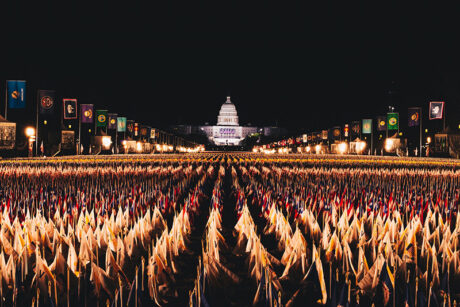
For Strickland, his pride in Bandit Lites is the people at Bandit Lites. “I am so proud of our team. We’ve got a whole bunch of great people, and that’s really the main secret to our success. Fifty-five years is a long time, and you don’t stick around that long and succeed unless you have an incredible team. People have asked me, ‘Did I believe when I started, that 55 years later I’d be doing this?’ Not at all. It was just going to be cool to get paid to go to rock shows and have a lot of fun. It certainly has evolved, but it is still fun. Back when we started Bandit, we didn’t know anything; we didn’t know where it was going to go, we just knew it was fun. We were trailblazing. Today I look at the bookend point of view, to go from a high school gym with The Grass Roots in 1969 to Garth Brooks this past year doing 22 sold-out stadiums. That’s quite a journey. To get to do the Field of Flags in Washington, DC for the inauguration, to do a Super Bowl, to be standing at all the many different major events and concerts of the last 55 years, knowing that your firm and your folks are the ones involved; that Bandit is part of making an impact on people’s lives in that moment and bringing them together, it is an amazing feeling of pride. It really has been some journey, and it is far from over.”


